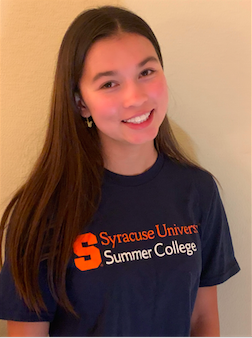Course Overview
The Environmental & Interior Design Summer College Program at Syracuse University introduces high school students to design principles and methods focused on the built environment. Through the exploration of the art and architecture of environmental design, students learn about the expanding practices of interior architecture, interior design, and spatial design. This studio uses the city as a laboratory to investigate the historical, cultural, and behavioral impacts of design.
Students work closely with faculty to develop research, ideation, iteration, and making skills within a broader context. Individual exercises engage form, space, time, and movement in a project developed through a structured conceptual process. Field documentation, drawing, diagramming, and model-making are supplemented by group discussions of contemporary issues impacting the built environment. Projects include both two- and three-dimensional works employing line, shape, color, texture, and space essential for college admissions portfolios intended for a range of design disciplines.
All students who successfully complete the course will receive a Certificate of Completion and have the opportunity to request a Syracuse University noncredit transcript.
Learning Objectives
By the end of this class, students will be able to:
- Understand what Environmental and Interior Design Degree program at Syracuse University offers
- Express ideas and their rationale developed in the design process through visual media: ideation drawings and sketches
- Demonstrate the ability to draft orthographic views of both small objects and a small scale environment
- Show awareness of human scale and the influence of furnishing, objects, materials, and finishes on human and environmental wellbeing
- Gain basic knowledge and develop computer skills of 2D drafting and 3D modeling using SketchUP software
Course Information
Course Prefix and Number: SCN 033
Format: On Campus (at Syracuse University)
Eligibility: Students must be of rising high school sophomore, junior, or senior status – or a 2025 high school graduate.
Credit: NC
Grading: Pass/Fail
- Residential: $4,295
- Commuter: $3,318
Program rates are subject to change and will be approved by the board of trustees. Discounts and scholarships are also available.
Program Information
Summer College – On Campus: Experience what college is really like: take a college-level course, live in a residence hall, have meals with friends in a dining hall, and participate in activities and events on campus.

“Syracuse University Summer College was a real eye-opening experience for me. I’ve always been interested in design, but truth be told I didn’t know much at all about it. In my Environmental and Interior Design class, I picked up more information and tips and tricks than I ever expected going in. I’m taking a design course in school this year, and I’m already far ahead of the rest of the class because of the knowledge I gained over the summer. Professor Lee was so kind as well as the TA’s and they never hesitated to give us as much help as possible.”
— Nina L., Summer College Environmental and Interior Design Student, 2020
Course Dates and Details
| Program | Course Dates | Class Time (Eastern Time) | Credit/Noncredit |
|---|---|---|---|
| Summer College – On Campus | 2-Week Session I: Sunday, July 6 – Friday, July 18, 2025 | MTWThF; 9 a.m. – 4 p.m. | Noncredit |
To see if this course is ‘open,’ refer to the full course catalog.
Typical Day
Tentative Schedule
First week:
AM: Students will develop skills in ideation drawings and sketches while participating in in-class activities individually and small groups. They will work on (2) small design projects.
PM: Students will learn how to use SketchUP software, and apply the software skills when completing the design projects.
Second week:
AM: Students will begin their final project with research and ideation drawings and sketches
PM: Students will develop their design digitally and review with the instructor and the teaching assistants
Faculty Bios
SeWoong Kim

SeWoong Kim is an assistant professor of environmental and interior design in the School of Design.
Prior to joining Syracuse University, Kim served as an instructional assistant professor at Texas A&M University’s Department of Architecture (2022-23), where he taught design foundations, design and visual communication, and architecture design studio. From 2020-22 he served as instructor of record at Texas A&M’s Department of Landscape Architecture and Urban Planning, where he taught urban history and theor. From 2018-20 he served as a graduate research assistant for Texas A&M’s Microclimatic Design Research Group
Kim has published peer-reviewed articles in such journals as Science of The Total Environment, Landscape and Urban Planning, Open House International, Renewable and Sustainable Energy Reviews, and Atmosphere.
Kim is an associate member of the Korea Institute of Registered Architects and the Architectural Institute of Korea. He received an Excellence Award as part of the 25th SPACE Prize for International Students of Architectural Design, SPACE Group, Seoul, Korea.
Kim earned a Doctor of Philosophy from Texas A&M University; a Master of Urban Design from the University of California, Berkeley; a Master of Engineering in architecture from Inha University, Korea; and Bachelor of Science in architectural engineering from Inha University. He holds an engineer architecture license from South Korea.
